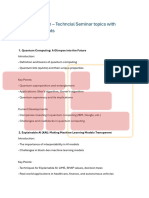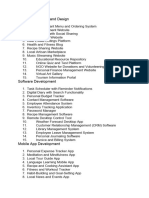0% found this document useful (0 votes)
47 views3 pagesProjects - Topics List
The document presents a comprehensive list of research project topics across eight sets, focusing on emerging technologies, data science and AI, software development, cybersecurity, cloud computing, digital business, educational technology, and social impact and governance. Each set contains various specific topics that explore current trends, challenges, and innovations in their respective fields. This structured approach provides a framework for students to select relevant and impactful research areas.
Uploaded by
5432 Aashish AtreCopyright
© © All Rights Reserved
We take content rights seriously. If you suspect this is your content, claim it here.
Available Formats
Download as PDF, TXT or read online on Scribd
0% found this document useful (0 votes)
47 views3 pagesProjects - Topics List
The document presents a comprehensive list of research project topics across eight sets, focusing on emerging technologies, data science and AI, software development, cybersecurity, cloud computing, digital business, educational technology, and social impact and governance. Each set contains various specific topics that explore current trends, challenges, and innovations in their respective fields. This structured approach provides a framework for students to select relevant and impactful research areas.
Uploaded by
5432 Aashish AtreCopyright
© © All Rights Reserved
We take content rights seriously. If you suspect this is your content, claim it here.
Available Formats
Download as PDF, TXT or read online on Scribd
/ 3




















































































